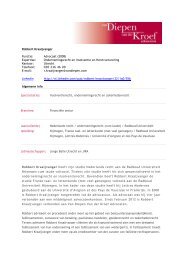© Van Diepen Van der Kroef Advocaten
© Van Diepen Van der Kroef Advocaten
© Van Diepen Van der Kroef Advocaten
- No tags were found...
Create successful ePaper yourself
Turn your PDF publications into a flip-book with our unique Google optimized e-Paper software.
Article 6 ECHR only if the institutions involved offer a reasonable alternative for protectionof human rights un<strong>der</strong> the ECHR. If this is not the case the ECHR prescribes that theimmunities nvoked by the international organisation are not to be respected.’180. The District Court has further erroneously consi<strong>der</strong>ed un<strong>der</strong> legal consi<strong>der</strong>ation 5.24 that:‘The Court does not consi<strong>der</strong> it necessary in the light of this jurisprudence to investigatewhether an alternative remedy is available to the Association et al. at the UN. The Courtconsi<strong>der</strong>ed on this as follows. The UN was founded before the ECHR came into force. Therecan be no question therefore of a restriction of the protection of human rights un<strong>der</strong> theECHR by transfer of powers to the UN. Moreover, the UN is an organisation with, as saidbefore, an almost universal membership. The international organisation that thejudgments in Beer and Regan v. Germany en Waite and Kennedy v. Germany related to,namely, the European Space Agency, was founded in 1980 and therefore some consi<strong>der</strong>abletime after the entry into force of the ECHR. This organisation has a restricted – European –membership. The UN’s position therefore is very dissimilar to it. The ECHR has actuallytaken the special position of the UN as a point of departure in the aforementioned cases ofBehrami v. France and Saramati v. France, Germany and Norway. All this justifies theconclusion that motivations of the European Court of Human Rights in the cases of Beer andRegan v. Germany and Waite and Kennedy v. Germany do not apply to the UN. It deservesspecial mention that if this were the case, un<strong>der</strong> the ECHR as a result of the primacy ofinternational-law immunities it is primarily that state that would be liable for not allowingaccess to a court of law within whose territory the institution in question has its seat orthe asserted wrongful act was committed. In the present case this is certainly not theNetherlands.’Explanation of ground of appeal 14181. Ground of appeal 14 addresses itself to the judgment of the District Court on the meaningand review of Article 6 ECHR and the grounds for that judgment.182. The Court correctly held un<strong>der</strong> legal consi<strong>der</strong>ation 5.22 that the right of access to the courtlaid down in Article 6 ECHR is a fundamental right. It is incomprehensible that the Courtthen proceeds with little ceremony to hold that this fundamental right should yield beforeinternational law immunity. The judgment that holds that a human right – laid down in the<strong>©</strong> <strong>Van</strong> <strong>Diepen</strong> <strong>Van</strong> <strong>der</strong> <strong>Kroef</strong> <strong>Advocaten</strong> page 77 of 99
















